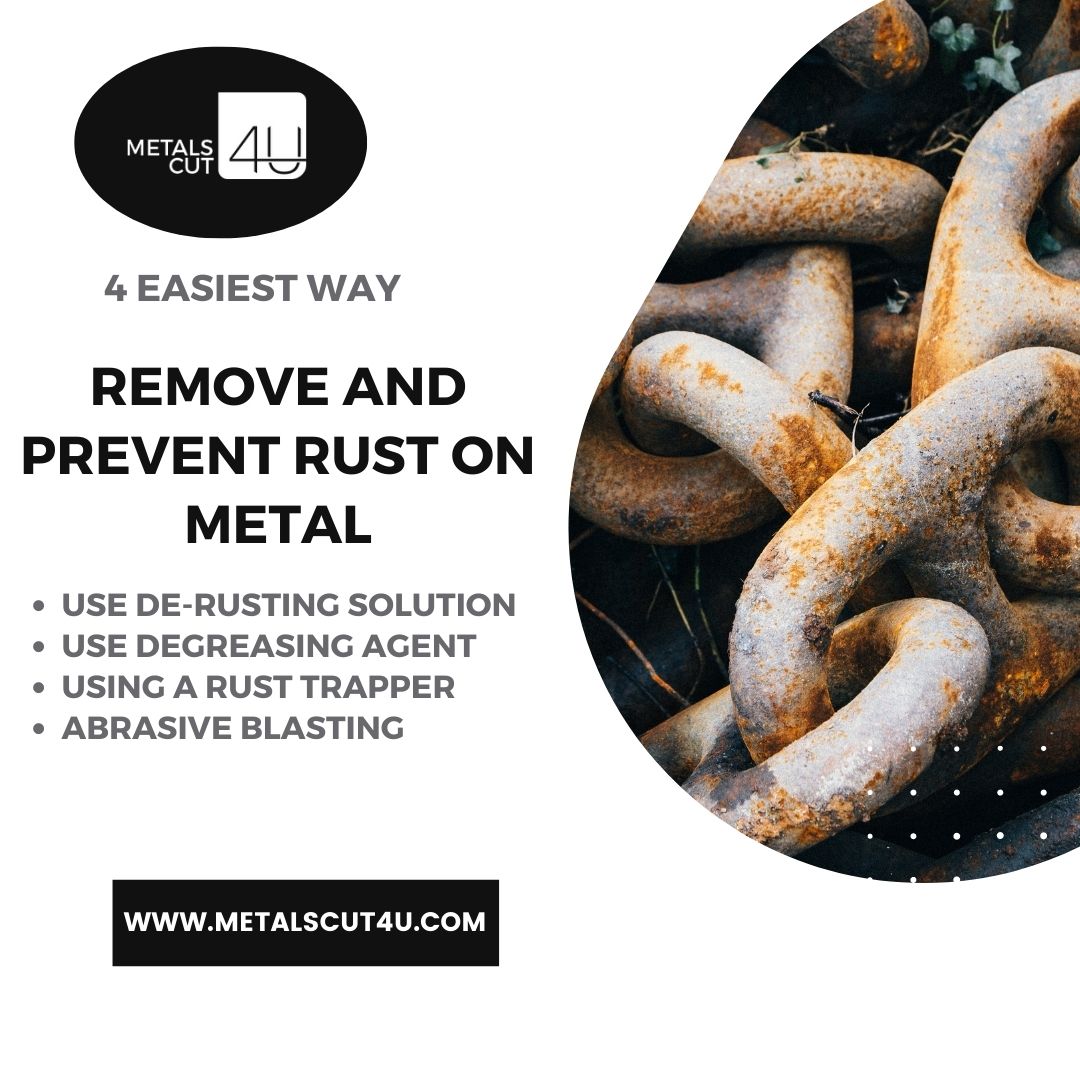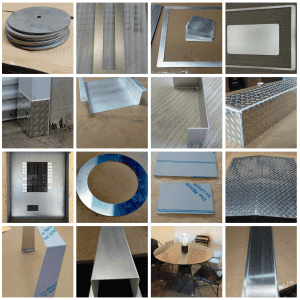4 Easiest Way to Remove and Prevent Rust on Metal

There is several ways that rust can form on objects. Certainly, one of the most observed ways is when iron corrodes to create rust. This happens when there is a reaction between water and iron which causes the water to react with oxygen in the air and create an electrochemical cell.
The cell then produces electrons at one electrode (usually steel) and oxidizes electrons from another electrode (usually iron). These reactions cause ferrous ions (Fe2+) in steel to combine with ferric ions (Fe3+) in iron, creating metallic FeO, or so-called rust. In fact, rust is the reason most industries don't use iron for their regular uses. When it comes to the rusting of metal, there are five main factors to be aware of. They are:
-
Temperature: The higher the temperature, the more oxygen an object can absorb. An object is more likely to rust at a temperature greater than 25 degrees Celsius. So lower temperatures in the lack of moisture could help rust prevention.
-
Volume: The greater the number of ions present in a solution, the faster rusting will occur. In other words, increasing volume means increasing rusting speed. This is why rust prevention measures also consider the volume of the solution.
-
Surface: The more oxidized the surface is, the larger the number of ions present, and thus an increased risk of rusting. Galvanization helps rust prevention.
-
Loss of electrons: These can be from other metals that have more number of electrons per atom (such as zinc) or from oxidation.
-
Friction: Friction, in general, increases heat and causes blisters, both of which cause rust. Temperature, Volume and Surface are all used to determine the Rate Constant for a reaction which could help one determine some rust prevention tactics.
What Creates Rust?
Several factors can contribute to rust, depending on the underlying chemical reaction. For example, when iron reacts with oxygen and water, together they create a chemical reaction that causes iron to oxidize. This reaction occurs in certain areas of the body, causing the rusting of iron.
It is important to note that the scratches or abrasions should not be deep enough to cause damage to the surface or the metal underneath it. They should always be superficial for them not to cause any damage to the metal below it. This usually leaves one wondering - how to remove and prevent rust on metal? Rusting defines an important problem for most people. So let's get into that.
How Do You Prevent Rusting Of Metals?
1. Use Rustproofing Compounds
Rubber-bristled brushes, rags, and compressed air can be used to remove corrosion by removing oxide film and contamination from the surface of the metal. Most rustproofing compounds have oxidizing salts in them and prevent oxidation on the metal surface by neutralizing oxidation caused by water along with preventing new oxide films from forming on the surface of your metals. This is one of the best ways of rust prevention.
2. Inhibiting The Further Reaction
Water and oxygen can cause steel to rust. Water is necessary for the reaction, so it's best to keep iron away from any sources of water. To prevent further rusting and limit salt or iron oxide formation, apply a new surface coating on the metal. Likely one of the more common ways of rust prevention.
3. Stop reaction by using an inhibitor
Adding corrosion inhibitors or polymer sealants to your metals can stop the reaction from continuing and reduce more damage. These inhibitors are usually applied to the metal in a liquid form in which the corrosion inhibitors are dissolved. When applied, they prevent oxidation of the metal by preventing corrosion and moisture from contacting with your metal object further helping rust prevention.
4. Using an inhibitor that neutrally affects the surface of your metal object
These can be applied just like other types of corrosion inhibitors. But if you have already encountered rust on your metals, a product (such as those mentioned above) will help to stop further rusting and prevent the damage caused. Using a rust prevention spray can also be effective.
Now, these four are some of the most commonly used ways of rust prevention that work and work great. But what if something is already rusted and has to be recovered? Restoration of objects can be a challenging task but it is possible for sure. Here is how you could remove and stop the rusting of iron.
Ways To Remove Rusting
1. Use De-rusting Solution
When rusted, steel can be cleaned of rust by dissolving it. One such popular method is the sulfuric acid bath. When steel is placed into a container of sulfuric acid, it will react with the metal until the rust completely dissolves. When this solution is heated, the rust will turn a milky white colour and easily dissolve in the container.
2. Use Degreasing Agent
This is another popular way to clean the rusting of iron or steel. Degreasing agents are used for dissolving rust, lead, and other forms of corrosion. These agents are mainly composed of acids or alkalis. They are also toxic if used improperly - if left out for long, they easily turn into toxic waste matter. When using a derusting solution on your metal objects, it's best to first wash them off with soap and water before using de-rusting solution on them.
3. Using A Rust Trapper
Rust trapper is an effective way of stopping the formation of iron oxide, which is the most common reason for rusting. But, where some acids and alkalis are stronger than others, rust trappers are weaker than any of them. Rust trappers aren't as strong as other cleaning solutions, but they have their own uses.
4. Abrasive Blasting
This is a process that doesn't use chemicals or solvents to clean off the rust, but instead uses particles that grind off the oxidation, causing rust on iron or steel. When done correctly, this can help restore and repair objects, such as household appliances, railings and ironwork.
So, now you know how to remove and prevent rust on metal in any situation. If the work seems like too much, it's not a bad idea to consult with an expert who knows how to deal with metals and to help you out with rust prevention. This will save you all the fuss. You should consider rust prevention when buying new things or while constructing your new home.
What Kind Of Damage Could Rust Cause?
When rusted metals get wet, water and oxygen can react with the iron in the metal, forming rust. When this happens, the rust will damage the metal. Some of the damages that rust causes are:
-
The creation of holes and openings
-
Raising and displacing hardware
-
Cracking, spalling and flaking
-
Shrinking of hardware or parts attached to it
-
Corrosion causing stress
Wear-out or degradation of materials made from iron or steel, such as wrought iron rods, cast iron pipes, cast steel bolts and nuts, etc. When exposed to oxygen, it causes them to deteriorate quicker than normal. This is why rust prevention should be a major priority.
Some Common Rust Prevention Hacks
1. Painting The Metal Regularly
This is a good way to protect your metals from rusting, especially when you are already aware that the metal surface will be exposed to water or rain. When you do this, ensure that the paint or coat is applied well and won't peel off. To keep rust prevention going for a long time, keep repainting the surfaces every few months.
2. Use Rust-Resistant Metals
Try using some rust-resistant metals like stainless steel for surfaces where there will be exposed to moisture so that they could be protected from rusting in the future. If chemicals such as acid will come into contact with this metal, then it will remain unaffected by these chemicals and won't corrode due to them as oxidation won't form on its surface and help easily with rust prevention.
3. Storing Your Iron Objects Properly
When not in use, be sure to store your metal objects in a dry place with the least exposure to moisture possible. It's also good if you could cover them up with a cloth material or plastic so that excess moisture won't come into contact with your objects which may cause rust. You won’t even need a rust prevention spray for metals in this case.
Rust prevention can be bothersome, but it is the most essential factor you need to care about while purchasing anything metallic. Check if your metals have been galvanized, a process that helps rust prevention. Also, see if you could potentially replace your iron object with a different alloy that won't rust. Simple thoughts like this go a long way, rust defines one of many problems, and sorting it out should be a priority.
If you need more guidance or want to learn more ways to prevent your metal surface from rusting, reach out to MetalsCut4U!
